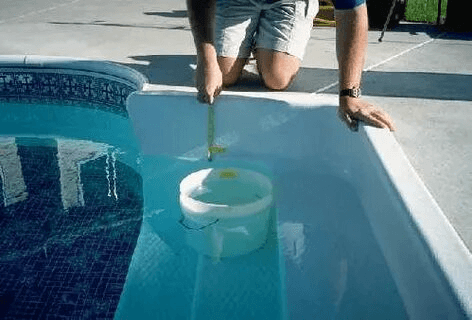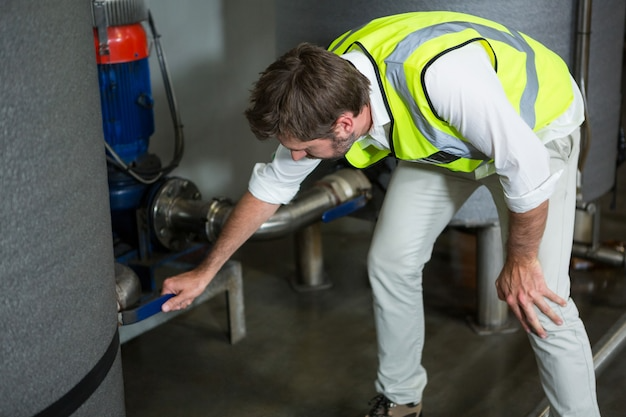Imagine spending a nice day by the pool when you suddenly notice that the water level has gone down. This might mean there’s a leak in your pool, which can put a damper on pool ownership.
In this guide, we’ll cover everything you need to know about pool leak detection. We’ll start by explaining what causes pool leaks, and then we’ll give you some easy DIY methods and professional solutions to fix them. By the end, you’ll be able to detect pool leaks and fix them like a pro!
Detecting Pool Leaks: Utilizing the Bucket Method
Discovering leaks in your pool is crucial for maintenance. One effective technique for this is the bucket method:

- Position a 15-20 liter plastic bucket on the second step of your pool.
- Fill the bucket to match the pool’s water level and mark it.
- Shut down any pool equipment that might influence water levels.
- Wait 24 hours, then compare the levels. If both decrease equally, it’s likely evaporation; if the pool’s level drops more, there’s probably a leak.
- To pinpoint the leak, repeat the process with the pump running for another 24 hours.
- If the pool loses more water under pressure, the leak may be in the filtration system or plumbing.
By employing the bucket method, you can effectively identify and address pool leaks, ensuring proper maintenance and water conservation.
1. Understanding Pool Leak Detection
Structural Issues
detect pool leaks can result from structural issues such as cracks in walls or floors. We’ll discuss how these problems occur and affect water containment.
Plumbing Problems
Faulty plumbing is another prevalent cause of pool leaks. We’ll discuss the vulnerable points in a pool’s plumbing system and how to identify and address these issues promptly.
Wear and Tear Over Time
Pools, like any structure, deteriorate over time. We will examine the factors contributing to leaks and share tips on maintaining pool integrity.
2. DIY Approach to Detecting Pool Leaks: Methods and Tips
Step-by-step Guide for Visual Inspection
Learn how to perform a thorough visual inspection of your pool to spot potential leaks. We’ll guide you through the process, emphasizing areas that often go unnoticed.
Water Loss Monitoring Techniques
Discover techniques to monitor water loss effectively. We’ll discuss the importance of understanding your pool’s normal water evaporation rate to differentiate it from leaks.
Utilizing DIY Tests
DIY tests are a practical way to identify leaks. We’ll explain the process and how to interpret the results, empowering you to take control of your pool’s maintenance.
3. Advanced Leak Detection Methods
Pressure Testing
Explore the advanced technique of pressure testing to pinpoint leaks accurately. We’ll explain the equipment needed and guide you through the steps for a successful test.
Electronic Leak Detection Equipment
Get acquainted with electronic leak detection tools that make the process more efficient. We’ll discuss their advantages and limitations, helping you make an informed decision.
Infrared Technology
Uncover the magic of infrared technology in detecting hidden leaks. We’ll elaborate on how this cutting-edge method works and when it’s most beneficial.
4. Hiring Professionals for Pool Leak Detection
Benefits of Professional Pool Leak Detection Services
Sometimes, it’s best to leave it to the experts. We’ll outline the advantages of hiring professionals, from accuracy to time-saving.

Selecting the Right Professionals
Not all professionals are created equal. We’ll guide you in choosing the right experts for your pool leak detection needs, ensuring a reliable and trustworthy service.
Cost Considerations
Explore the costs associated with professional pool leak detection services. We’ll provide insights into what factors affect the pricing and help you budget accordingly.
5. Repairing Pool Leaks
Identifying the Type of Leak
Before jumping into repairs, understanding the type of leak is crucial. We’ll discuss the different types and their respective repair methods.
DIY Repairs vs. Professional Assistance
Evaluate the feasibility of DIY repairs versus seeking professional assistance. We’ll guide when to roll up your sleeves and when to call in the pros.
Importance of Prompt Repairs
Delaying repairs can escalate the damage and costs. Learn why prompt action is essential and how it can preserve your pool’s longevity.
6. Preventing Future Pool Leaks Detections
Regular Maintenance Practices
Discover simple yet effective maintenance practices to prevent future leaks. We’ll emphasize the importance of consistency in upkeep.
Upgrading Pool Equipment
Explore how upgrading your pool equipment can contribute to leak prevention. We’ll discuss modern technologies that enhance pool integrity.
Monitoring Water Chemistry
Maintaining the right water chemistry is crucial. We’ll provide insights into the impact of water balance on pool structures and how to keep it in check.
7. Importance of Timely Repairs
Impact on Water Conservation
Beyond the pool’s borders, timely repairs contribute to water conservation. We’ll discuss the environmental impact of addressing leaks promptly.
Preventing Structural Damage
Leaving leaks unattended can lead to structural damage. We’ll highlight how timely repairs safeguard your pool’s structural integrity.
Avoiding Escalated Repair Costs
Procrastination often leads to higher costs. We’ll explain how addressing leaks promptly can save you money in the long run.
Conclusion
In this guide, we have covered how to detect pool leaks, with methods ranging from DIY to professional solutions. Taking proactive steps towards leaks ensures greater enjoyment of your pool for longer.
FAQs
1. What are the main signs of a pool leak?
Look out for unexplained drops in water level, soggy areas around the pool, and a sudden increase in water bills.
2. Can pool leaks be fixed without professional help?
Small leaks may be fixed DIY, but for accurate and lasting solutions, professional assistance is often recommended.
3. How often should I inspect my pool for leaks?
Regular inspections every few months, especially before the swim season, can help catch and address potential leaks early.
4. Are pool leaks covered by insurance?
It depends on your insurance policy. Some coverages may include pool leaks, so check with your provider.
5. Can a small leak lead to significant damage?
Yes, even a small leak can escalate, causing structural damage and leading to costly repairs if not addressed promptly.


